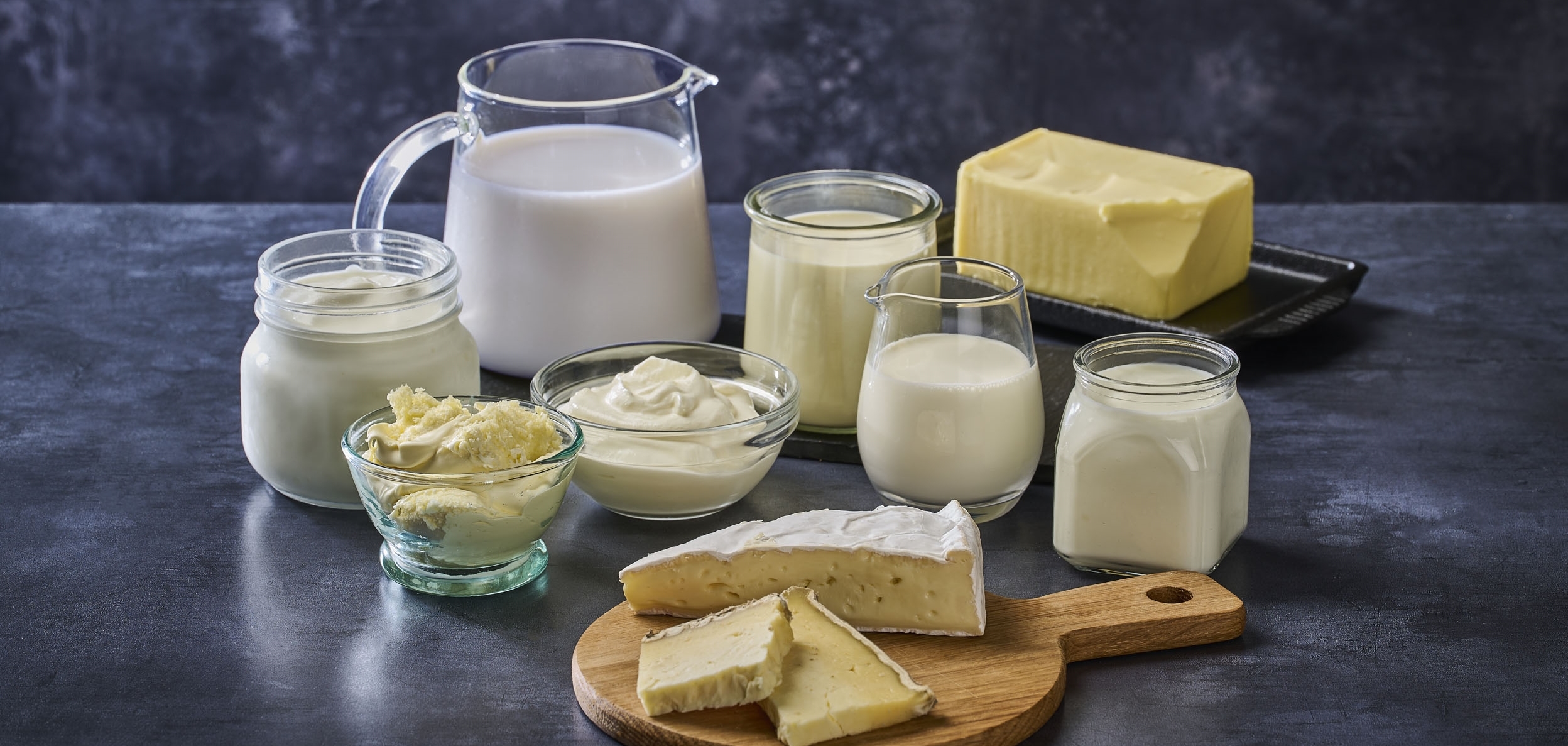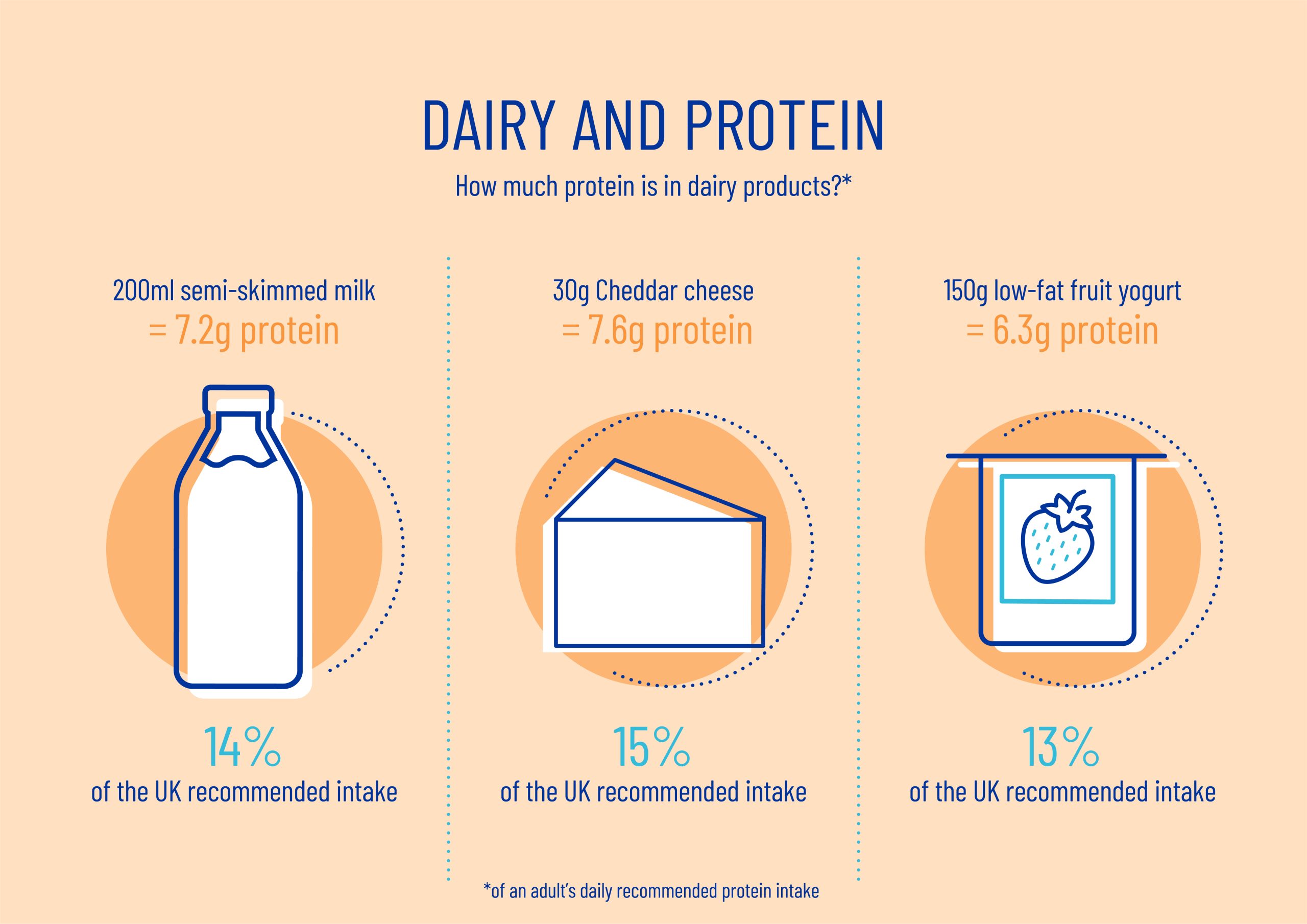New Year fitness plans mean many of us will be looking to boost protein to support our workouts. Registered dietitian Juliette Kellow reveals how enjoying dairy as part of a balanced, healthy diet offers a simple solution to pack a protein punch…
With the New Year in our rear view mirror, many of us will be making resolutions to improve our health – and if previous years are anything to go by, getting fit is likely to be a priority. Last year, a YouGov survey revealed doing more exercise topped the resolution polls, with fitness being put first by almost half (49%) of those Brits who were planning to make a resolution – ahead even of improving diets, losing weight and saving money.
It’s great news for our health but can leave some of us wondering whether we need to up the protein in our diet to support our fitness plans.
Protein is found in every single cell and tissue in our body and forms part of enzymes, hormones and antibodies. It helps maintain our bones and is a component of cartilage, blood, hair, nails and skin – collagen, for example, is a type of protein. But there’s a reason why protein is so intrinsically linked to fitness and that’s because it’s vital for the growth and maintenance of muscle mass. In fact, the biggest amount of protein in our body – typically around 43% – is in our muscles.
Protein in Milk: A tasty way to put protein on the menu
The good news is, for most of us – including anyone looking to start a fitness plan – it’s easy to get enough protein from a healthy, balanced diet. That’s thanks to protein being found in many of the foods we already enjoy such as milk, cheese and yogurt, as well as meat, poultry, fish, eggs, soya, nuts and seeds.
Dairy products are particularly great choices, thanks to both the quantity and quality of protein they contain. Protein is made from building blocks of amino acids linked together in long chains. There are around 20 amino acids in animal and plant foods. For adults, nine of these can’t be made by the body so need to be supplied in the food we eat. Dairy products – like other animal sources of protein – provide all of these ‘essential’ amino acids and so are sometimes described as providing ‘good or high quality’ protein. Plant foods such as pulses, nuts and seeds usually lack one or more of these essential amino acids. Whilst it’s true that eating a variety of plant foods can supply all the essential amino acids our body needs, it does require careful meal planning and nutritional knowledge to do so.
Protein needs
In the UK, it’s recommended adults have 0.75g protein per kg of body weight. This means someone who weighs 60kg would need around 45g protein a day and someone who weighs 73kg would need 55g protein a day. As a guideline, food labels give a Reference Intake of 50g protein. Dairy products can make an important contribution to this:
Protein in Milk Infographic – The protein in semi-skimmed milk, cheese and yogurt contributes the following to an adult’s daily recommended protein intake.
200ml glass semi-skimmed milk
7.2g protein = 14% of Reference Intake for protein
30g Cheddar cheese
7.6g protein = 15% of Reference Intake for protein
150g pot low-fat fruit yogurt
6.3g protein = 13% of Reference Intake for protein
What about protein when exercising?
While it might be tempting, there’s no need to start downing protein shakes or snacking on egg white omelettes when starting a new fitness regime, especially if you already eat a varied diet. According to the National Diet and Nutrition Survey, most people already have plenty of protein in their diet. On average, men have 85g and women have 67g protein a day, considerably more than the 50g Reference Intake and easily enough to support working out in the gym for an hour, doing a step, spin or Pilates class, or going for a half-hour swim, cycle or jog.
However, athletes and people who are training hard or doing a lot of strength work or endurance activities, generally have higher protein requirements to build and maintain muscle. This is often in the region of 1.2-2g protein per kilogram of body weight a day, depending on the type of activity and training.
Again, it’s often easy to meet these higher protein needs through enjoying a healthy, balanced diet. For example, three servings of dairy a day consisting of a 200ml glass of semi-skimmed milk, 30g Cheddar cheese and a 150g pot of low-fat fruit yogurt provides more than 20g protein. Experts recommend spreading protein intake evenly throughout the day for best results.
Meanwhile, there’s little benefit in increasing protein way beyond needs. Rather than boosting muscle mass further, any extra protein is used for energy and the excess nitrogen (a component of protein) is eliminated from the body.
It’s also a myth that eating large amounts of protein alone results in huge muscles. Muscle is gained through a combination of resistance exercises together with enough energy (calories), protein and carbohydrate in the diet. If carbs – the main energy providers in our diet – are lacking, then protein is used to provide energy instead of being used to build muscle! This means combining protein-rich dairy with energy-giving carbs is a good option, especially post workout when energy stores may be depleted. Great choices include cheese on wholegrain toast, fruit and yogurt, wholegrain cereal or porridge with milk, or a jacket potato with cottage cheese and salad.
A natural package for working out
Unlike supplements that are based on pure protein, dairy products have the advantage of being naturally packaged with an array of other nutrients that make them a great choice for when we are active. Milk and yogurt, for example, have a high fluid content – a glass of milk contains around 90% fluid, while around three quarters of a pot of yogurt is fluid. This can contribute to our fluid needs before, during and after exercise, helping us stay hydrated so we perform at our best.
Milk and yogurt also provide carbohydrate in the form of lactose. Carbs are the main energy source, which fuel the muscles and brain. Plus, dairy provides a range of vitamins and minerals that may support our workouts. These include:
- vitamins B2 and B12, which release energy from food and reduce tiredness and fatigue
- calcium and potassium, which are important for normal muscle function
- iodine, a nutrient in milk and yogurt that helps to maintain normal thyroid function and makes thyroid hormones, which help regulate our metabolism
In short, the unique package of nutrients in dairy products – which includes protein, carbohydrate, several vitamins and minerals, and fluid – can help REFUEL, REHYDRATE and RECOVER.
So, if fitness is a New Year goal for you, enjoying three servings of dairy products each day as part of a balanced, healthy diet is a winner.


